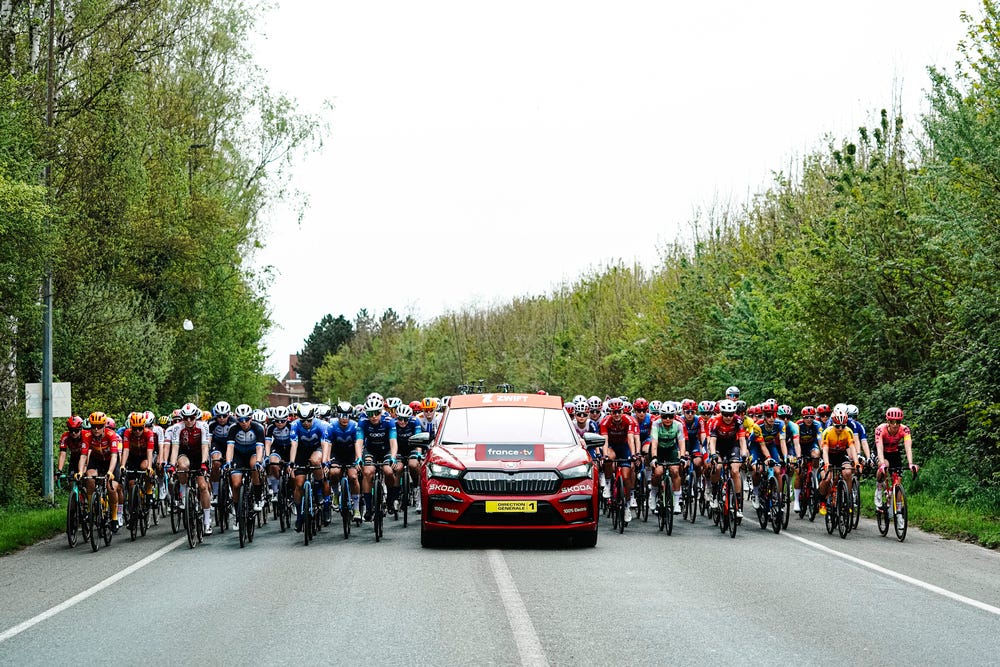How to make pro cycling more diverse - part 2
Cycling has an ethnic diversity problem. Here's how I would fix it.
Last week I began making the case for how to make cycling more diverse. Over the weekend in northern France, we saw in evidence how the sport is built around its West European roots.
Paris-Roubaix, the Queen of the Classics, is one of the cycling’s oldest and most revered races. Beginning in 1896, only three times has the great race been won by a rider from outside of Europe - when Australians Stuart O’Grady and Mat Hayman won the race in 2007 and 2016 respectively and most recently Alison Jackson winning the women’s race for Canada in 2023.
Last Sunday, Eritrean Biniam Girmay became one of less than two dozen Africans to ever take to the race. On debut he scored the best result ever by an African man with 15th.
This history is to be celebrated and enjoyed. The feeling that the historic narrative of a race like Paris-Roubaix conjures is one that is rare in sport, and it’s what draws many fans in to a love and obsession for professional cycling.
However, the lack of diversity at Roubaix and many races this spring is striking. It makes me wonder whether the history and culture of the sport is compatible with making it more inclusive, growing its diversity and globalising its reach. I don’t have the answers to that, but it’s something to ponder.
Last week, in part one of How to make pro cycling diverse, I explored three things that need to happen to globalise the sport and make it more inclusive. They were to boost racing at all levels outside Europe, create and encourage diversity-focused teams and to develop coaching standards.
Below are the next two - once again the first one is free, but here’s a special offer for a year’s subscription to enable you to read them all.
Transform cycling culture
Is cycling a welcoming, inclusive sport? Most will read that and their personal experience will tell them ‘yes’. However, I think the answer to the question depends on who you ask, which might suggest the answer is ‘no’.
This week an article that I wrote for Cycling Weekly went to print in which I looked into the lack of diversity in competitive cycling in the UK. There are 148 British-registered riders on UCI teams in 2025, just one is from an ethnic minority. Go to any road cycling race at any level up and down the country and the sport’s lack of ethnic diversity is easy to see.
There are lots of different reasons for this, but a crucial one that I found while writing the article was the culture and attitudes prevalent in the sport in the UK and across Europe. The most recent edition of the Diversity in Cycling report was published in 2022, a report which sought to understand more about the cycling experiences of people from ethnic minorities in the UK at to suggest how diversity could be improved across the board.
The report goes into detail on a number of factors which influence cycling’s inclusivity, but one that stands out is the attitudes of long-standing cycling clubs and the wider racing scene. The report calls cycling the ‘new golf’, claiming that there is an elitism within the culture of the sport. There is a subconscious thought-pattern for many that means that the sport is for certain kinds of people, riding certain kinds of bikes, wearing certain kit and acting in a certain way. This, the report claims, is deterring people from diverse backgrounds from participating in cycling, particularly at a competitive level. Andy Edwards, the report’s author, told me for CW that he found “a lack of awareness and microaggressions, such as Lycra Bros staring at a Muslim guy with baggy shorts over his Lycra.”
Now this point may cause some anger from certain quarters. Is he saying that the cycling community is racist??!! No, I’m not. And none of the people I interviewed said that either. It’s about self-awareness and analysing unconscious bias. The stats tell us that the sport in the UK and the rest of Europe is excluding or deterring people from non-white backgrounds, despite a rapid increase in cycling as a recreational activity within ethnic minorities in the UK. Any responsible person would ask questions about the sport’s culture and its role in that.
Pick up a copy of CW for more on this, and read the Diversity in Cycling report.
Keep reading with a 7-day free trial
Subscribe to Global Peloton to keep reading this post and get 7 days of free access to the full post archives.




